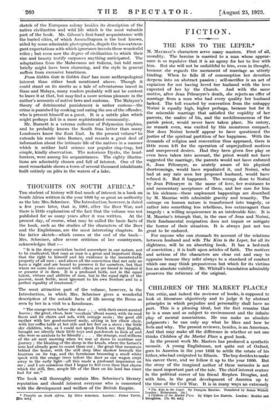FICTION • THE KISS TO THE LEPER.* M. MAURIAC'S characters
serve many masters. First of all, morality. The heroine is married to a man whose appear- ance is so repulsive that it is an agony for her to live with him. But she will not be unfaithful to him, even in thought, because she regards the sacrament of marriage as utterly binding. When he falls ill of consumption her devotion deepens into an abstract passion ; self-sacrifice is an act of expiation for not having loved her husband with the love expected of her by the Church. And with the same motive, after Jean Peloueyre's death, she rejects an offer of marriage from a man who had every quality her husband lacked. The toll exacted by convention from the unhappy Noemi is equally high, higher perhaps, because but for it the miserable marriage that satisfied the cupidity of her parents, the malice of his, and the meddlesomeness of the parish priest, would never have taken place. No outcry, no remark even, was excited by this monstrous compact. Nor does Nciemi herself appear to have questioned the justice of the spiritual partition of her happiness. With the demands of religion and convention thus appeased, there is little room left for the operation of unprejudiced motives and unreproved desires. Had they been given free play or even been taken into account, the priest would not have suggested the marriage, the parents would not have enforced it, Jean Peloueyre, so acutely aware of his physical shortcomings, would have repudiated it, and Noemi, who had at any rate seen her proposed husband, would have refused it. But it happened. The wrongs done to Noemi by Jean Peloueyre in the name of love, her resistance to and momentary acceptance of them, and her care for him in his sickness—these unpleasant happenings are described by M. Mauriac with admirable gravity and tenacity. The outrage on human nature is transformed into tragedy, or rather into something less rebellious, less extravagant than tragedy : a willing acquiescence in an intolerable fate. It is M. Mauriac's triumph that, in the case of Jean and Noemi, their fundamental resignation does not impair or mitigate the horror of their situation. It is always just not too great to be endured.
For anyone who can stomach its account of the relations between husband and wife The Kiss to the Leper, for all its slightness, will be an absorbing book. It has a bed-rock of conviction ; it is built upon articles of faith. The motives and actions of the characters are clear cut and easy to appraise because they refer always to a standard of conduct which one may think preposterous but which for its victims has an absolute validity. Mr. Whitall's translation admirably preserves the reticence of the original.


































 Previous page
Previous page